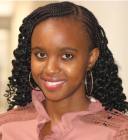Protecting democracy and human rights, particularly regarding the inclusion of lesbian, gay, bisexual, transgender and gender-diverse, intersex and queer (LGBTIQ+) individuals in Southern Africa, has been a complex and ongoing challenge due to cultural, societal, and legal factors.
The idea that all people are equal and are the anchor for holding power and having influence is one of the main principles of democracy. In reflecting on the past year, Southern African Litigation Centre (SALC) LGBTIQ+ Programme Officer, Bradley Fortuin says they have seen a wave of regression and backsliding regarding the search for equality, inclusion and representation. He said significant and unforgettable cases as well as initiatives have demonstrated progress and highlighted the struggles faced by the LGBTIQ+ community in the region.
In an interview with The Midweek Sun, Fortuin said in August 2023, Botswana witnessed members of the Evangelical Fellowship of Botswana (EFB) taking part in a series of countrywide protest marches against government intention to protect LGBTIQ+ people. According to Fortuin, the right to freedom of association and assembly for minority groups was also denied the LGBTIQ+ advocacy group, Eswatini Sexual and Gender Minorities, by the Eswatini government with the government claiming that LGBTIQ+ people are against the 'morals' of Eswatini traditions and hence have no place for legal recognition, signalling another blow towards equality and inclusion, in his view.
Such actions further push an already vulnerable and marginalised community to the margins, perpetuating inequality, exclusion and othering. Fortuin highlighted that five of 16 Southern African countries are heading for Presidential elections this year. According to him, in the past, during vicious and enthusiastic political campaigns, aspiring politicians used LGBTIQ+ people as scapegoats and incited violence and harassment to gain favour from the public by discrediting gains made regarding LGBTIQ+ people and equal rights.
“These malicious tactics are bound to happen again this year. Therefore, protecting democracy and human rights commitments, particularly regarding the inclusion of LGBTIQ+ individuals, requires a comprehensive and analytical approach considering various facets and critical players,”
Fortuin said. Such analysis, Fortuin says, can inform targeted strategies, policy reforms, and interventions to foster a more inclusive and equitable society for all individuals, irrespective of sexual orientation, gender identity and gender expression, and simultaneously offer accountability measures.
Fortuin said that some nations in the region have colonial-era laws that criminalise consensual same-sex relations, indicating that it is essential to review and amend these laws to ensure they align with international human rights standards. Countries such as Angola, Botswana, Mozambique, South Africa, and recently Mauritius, have decriminalised LGBTIQ+, marking significant strides towards equal rights. Fortuin said there is a need to examine, implement and enforce anti-discrimination laws that protect the LGBTIQ+ people now more than ever.
The African Charter on Human and People's Rights Resolution 275, which was adopted by the African Commission in 2014, calls for the protection of LGBTIQ+ people from any form of violence and discrimination, thus, the imperative to repeal discriminatory laws to safeguard LGBTIQ+ persons.
The idea that all people are equal and are the anchor for holding power and having influence is one of the main principles of democracy. In reflecting on the past year, Southern African Litigation Centre (SALC) LGBTIQ+ Programme Officer, Bradley Fortuin says they have seen a wave of regression and backsliding regarding the search for equality, inclusion and representation. He said significant and unforgettable cases as well as initiatives have demonstrated progress and highlighted the struggles faced by the LGBTIQ+ community in the region.
In an interview with The Midweek Sun, Fortuin said in August 2023, Botswana witnessed members of the Evangelical Fellowship of Botswana (EFB) taking part in a series of countrywide protest marches against government intention to protect LGBTIQ+ people. According to Fortuin, the right to freedom of association and assembly for minority groups was also denied the LGBTIQ+ advocacy group, Eswatini Sexual and Gender Minorities, by the Eswatini government with the government claiming that LGBTIQ+ people are against the 'morals' of Eswatini traditions and hence have no place for legal recognition, signalling another blow towards equality and inclusion, in his view.
Such actions further push an already vulnerable and marginalised community to the margins, perpetuating inequality, exclusion and othering. Fortuin highlighted that five of 16 Southern African countries are heading for Presidential elections this year. According to him, in the past, during vicious and enthusiastic political campaigns, aspiring politicians used LGBTIQ+ people as scapegoats and incited violence and harassment to gain favour from the public by discrediting gains made regarding LGBTIQ+ people and equal rights.
“These malicious tactics are bound to happen again this year. Therefore, protecting democracy and human rights commitments, particularly regarding the inclusion of LGBTIQ+ individuals, requires a comprehensive and analytical approach considering various facets and critical players,”
Fortuin said. Such analysis, Fortuin says, can inform targeted strategies, policy reforms, and interventions to foster a more inclusive and equitable society for all individuals, irrespective of sexual orientation, gender identity and gender expression, and simultaneously offer accountability measures.
Fortuin said that some nations in the region have colonial-era laws that criminalise consensual same-sex relations, indicating that it is essential to review and amend these laws to ensure they align with international human rights standards. Countries such as Angola, Botswana, Mozambique, South Africa, and recently Mauritius, have decriminalised LGBTIQ+, marking significant strides towards equal rights. Fortuin said there is a need to examine, implement and enforce anti-discrimination laws that protect the LGBTIQ+ people now more than ever.
The African Charter on Human and People's Rights Resolution 275, which was adopted by the African Commission in 2014, calls for the protection of LGBTIQ+ people from any form of violence and discrimination, thus, the imperative to repeal discriminatory laws to safeguard LGBTIQ+ persons.





